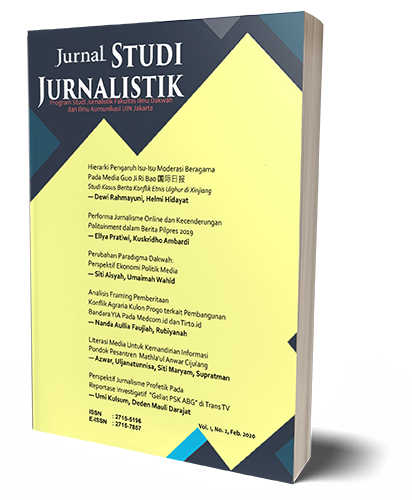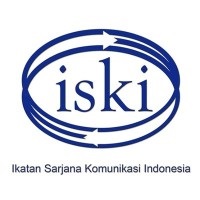The Hyperreality of Political Power: Political Condition of Indonesia During Pandemic in the Postmodern Era
DOI:
https://doi.org/10.15408/jsj.v6i2.42292Keywords:
Covid-19, Hyperreality, Indonesia Political Power, Metanarratives, Post-TruthAbstract
This article discusses Indonesia’s political power regarding policies dealing with the Covid-19 pandemic crisis through a postmodern perspective. Disruption of information as one of the characteristics of postmodernism has shown us that various media can mix all realities. The use of various media has made individuals experience confusion in drawing a real reality. A hyperreal form of meaning replaces the existing reality because it is formed by individual narratives replacing metanarratives. Meanwhile, factual truth has also been replaced by alternative truths that are the favorites of everyone. This study uses a qualitative descriptive analysis method through literature studies, instrumental case studies, and phenomenology. Facts and truth have become biased, saturated into more micro and individual forms, so individuals now have autonomy over their truth. This truth is due to hyperreality, where the sign becomes more real than reality itself. The Indonesian government’s policy regarding this pandemic is a reality that individuals want to abandon or take up. This dynamic form is currently happening in Indonesian society. Regarding the pandemic, the community has its own narrative in assessing vaccines as a tool to eradicate the spread of the Covid-19 pandemic.References
Akbar, C. (2020). Kominfo Catat Konten Hoaks Covid-19 Banyak Tersebar di Facebook. Tempo.Co. https://bisnis.tempo.co/read/1397145/kominfo-catat-konten-hoaks-covid-19-banyak-tersebar-di-facebook/full&view=ok
Amindoni, A. (2021). Covid-19: Panti sosial dan rumah sakit jiwa jadi klaster baru Covid-19, bagaimana ratusan penyandang disabilitas mental terpapar virus corona? BBC Indonesia. https://www.bbc.com/indonesia/indonesia-55583864
Andriyanto, H. (2021). Indonesia Passes 10,000 Coronavirus Cases in a Day, Sets Record for Third Straight Day. Jakarta Globe. https://jakartaglobe.id/news/indonesia-passes-10000-coronavirus-cases-in-a-day-sets-record-for-third-straight-day
Banjarnahor, D. (2021). Makin Ngeri! Kasus Aktif Covid-19 di DKI Tembus 19.000. CNBC Indonesia. https://www.cnbcindonesia.com/news/20210112154402-4-215371/makin-ngeri-kasus-aktif-covid-19-di-dki-tembus-19000
Barrera, O., Guriev, S., Henry, E., & Zhuravskaya, E. (2020). Facts, alternative facts, and fact checking in times of post-truth politics. Journal of Public Economics, 182, 104123. https://doi.org/10.1016/j.jpubeco.2019.104123
Baudrillard, J. (1981). For the Critique of the Political Economy of the Sign. Telos Press.
Baudrillard, J. (1983a). In the Shadow of the Silent Majorities...Or The End of the Social (Paul Foss Trans.). Semiotext(e).
Baudrillard, J. (1983b). Simulations (P. Foss, P. Patton, & P. Beitchman, Eds.). Semiotext(e).
Baudrillard, J. (1994). Simulacra and Simulation. Michigan University Press.
Baudrillard, J. (1998). The Consumer Society. SAGE Publications.
Baudrillard, J. (2007). Symbolic Exchange and Death. SAGE Publications.
Benesch, K. (2020). Is Truth to Post-Truth what Modernism Is to Postmodernism? Heidegger, the Humanities, and the Demise of Common-Sense. European Journal of American Studies, 15–1, 1–13. https://doi.org/10.4000/ejas.15619
Bernie, M. (2020). Survei LSI: Kepercayaan Publik ke Jokowi Turun Menjadi 75,2 Persen. Tirto.Id. https://tirto.id/survei-lsi-kepercayaan-publik-ke-jokowi-turun-menjadi-752-persen-elBb
Biesecker. (2018). Guest Editor’s Introduction: Toward an Archaeogenealogy of Post-truth. Philosophy & Rhetoric, 51(4), 329. https://doi.org/10.5325/philrhet.51.4.0329
Burawoy, M. (1979). Manufacturing Consent: Changes in the Labor Process Under Monopoly Capitalism. University of Chicago Press.
Burdman, J. (2020). Universality without consensus: Jean-François Lyotard on politics in postmodernity. Philosophy & Social Criticism, 46(3), 302–322. https://doi.org/10.1177/0191453719854215
CNN Indonesia. (2020). Istana Respons Survei Warga Tak Percaya Data Covid Pemerintah. CNN Indonesia. https://www.cnnindonesia.com/nasional/20200723163525-20-528243/istana-respons-survei-warga-tak-percaya-data-covid-pemerintah
Crittenden, V., & Peterson, R. A. (2019). Digital Disruption: The Transdisciplinary Future of Marketing Education. Journal of Marketing Education, 41(1), 3–4. https://doi.org/10.1177/0273475319825534
Davis, A. (2019). Political Communication: A New Introduction for Crisis Times. Polity Press.
Delamont, S., & Atkinson, P. (2009). Qualitative Research and the Postmodern Turn. In M. Hardy & A. Bryman (Eds.), Handbook of Data Analysis (pp. 667–681). SAGE Publications.
Happer, C., Hoskins, A., & Merrin, W. (Eds.). (2019). Trump’s Media War. Springer International Publishing. https://doi.org/10.1007/978-3-319-94069-4
Hartley, K., Kuecker, G., & Woo, J. J. (2019). Practicing public policy in an age of disruption. Policy Design and Practice, 2(2), 163–181. https://doi.org/10.1080/25741292.2019.1622276
Heidegger, M. (1985). Being and Time (John Macquarrie & Edward Robinson Trans.) (7th ed.). Basil Blackwell.
Hepp, A. (2013). Cultures of Mediatization. Polity Press.
Herman, E. S., & Chomsky, N. (1988). Manufacturing Consent: The Political Economy of the Mass Media. Pantheon Books.
Hietanen, J., Murray, J. B., Sihvonen, A., & Tikkanen, H. (2020). Seduced by “fakes”: Producing the excessive interplay of authentic/counterfeit from a Baudrillardian perspective. Marketing Theory, 20(1), 23–43. https://doi.org/10.1177/1470593119870214
Innis, H. (1977). The Bias of Communication. University of Toronto Press.
Karpf, D., Kreiss, D., Nielsen, R. K., & Powers, M. (2015). The Role of Qualitative Methods in Political Communication Research: Past, Present, and Future. International Journal of Communication, 9, 1888–1906.
Kim, H., Sefcik, J. S., & Bradway, C. (2017). Characteristics of Qualitative Descriptive Studies: A Systematic Review. Research in Nursing & Health, 40(1), 23–42. https://doi.org/10.1002/nur.21768
Lowe, D. M. (1982). History of Bourgeois Perception. University of Chicago Press.
Luke, T. W. (1991). Power and politics in hyperreality: The critical project of Jean Baudrillard. The Social Science Journal, 28(3), 347–367. https://doi.org/10.1016/0362-3319(91)90018-Y
Lyotard, J.-F. (1984). The Postmodern Condition: A Report on Knowledge (Geoff Bennington and Brian Massumi Trans.). University of Minnesota Press.
Lyotard, J.-F. (1994). The Differend: Phrases in Dispute (George Van Den Abbeele Trans.). Manchester University Press.
Madianou, M. (2014). Smartphones as Polymedia. Journal of Computer-Mediated Communication, 19(3), 667–680. https://doi.org/10.1111/jcc4.12069
Madianou, M. (2019). The Biometric Assemblage: Surveillance, Experimentation, Profit, and the Measuring of Refugee Bodies. Television & New Media, 20(6), 581–599. https://doi.org/10.1177/1527476419857682
Madianou, M., & Miller, D. (2013). Polymedia: Towards a new theory of digital media in interpersonal communication. International Journal of Cultural Studies, 16(2), 169–187. https://doi.org/10.1177/1367877912452486
Maijanen, P., von Rimscha, B., & Głowacki, M. (2019). Beyond the surface of media disruption: digital technology boosting new business logics, professional practices and entrepreneurial identities. Journal of Media Business Studies, 16(3), 163–165. https://doi.org/10.1080/16522354.2019.1700095
McLuhan, M. (1964). Understanding Media The extensions of man. New York: McGraw-Hill Education.
Morris, J. (2020). Simulacra in the Age of Social Media: Baudrillard as the Prophet of Fake News. Journal of Communication Inquiry, 019685992097715. https://doi.org/10.1177/0196859920977154
Mouffe, C. (2000). The Democratic Paradox. Verso Books.
Natalia, D. L. (2021). Presiden ajak masyarakat bersyukur Indonesia mampu kelola COVID-19. Antaranews.Com. https://www.antaranews.com/berita/1937856/presiden-ajak-masyarakat-bersyukur-indonesia-mampu-kelola-covid-19
Nicholls, B. (2017). Baudrillard in a ‘Post-Truth’ World: Groundwork for a Critique of the Rise of Trump. MEDIANZ: Media Studies Journal of Aotearoa New Zealand, 16(2). https://doi.org/10.11157/medianz-vol16iss2id206
Nugraheny, D. E. (2021). Jokowi: Alhamdulillah Indonesia Tidak Sampai Lockdown. Kompas.Com. https://nasional.kompas.com/read/2021/01/08/15073801/jokowi-alhamdulillah-indonesia-tidak-sampai-lockdown?page=all
Pakpahan, F. (2021). Kapasitas Pesawat Diperbolehkan Penuh, DPR: Bakal Picu Klaster Baru Covid-19. Sindonews.Com. https://nasional.sindonews.com/read/299256/12/kapasitas-pesawat-diperbolehkan-penuh-dpr-bakal-picu-klaster-baru-covid-19-1610470882
Peruško, Z., Vozab, D., & Čuvalo, A. (2015). Digital Mediascapes, Institutional Frameworks, and Audience Practices Across Europe. International Journal of Communication, 9, 342–364.
Plumer, B., & Davenport, C. (2019). Science Under Attack: How Trump Is Sidelining Researchers and Their Work. New York Times. https://www.nytimes.com/2019/12/28/climate/trump-administration-war-on-science.html
Prozorov, S. (2019). Why is there truth? Foucault in the age of post‐truth politics. Constellations, 26(1), 18–30. https://doi.org/10.1111/1467-8675.12396
Purba, P. G. T. (2020). Studi UI Ungkap Tak Sedikit Warga yang Percaya COVID-19 Konspirasi Elit Global. DW.Com. https://www.dw.com/id/studi-ui-ungkap-masih-ada-warga-percaya-covid-19-konspirasi/a-55810146
Radiansyah, R. R. (2019). Konsumerisme Hingga Hiper-Realitas Politik Di Ruang Publik Baru Era Cyberspace (Antara Kemunduran Atau Kemajuan Bagi Pembangunan Negara Indonesia Yang Demokratis). Jurnal Ilmu Sosial Dan Ilmu Politik, 3(2), 30–47.
Rahmat, M. Z. (2020). Indonesia’s poor COVID-19 responses take a toll on its global image. The Jakarta Post. https://www.thejakartapost.com/academia/2020/12/07/insight-indonesias-poor-covid-19responses-take-a-toll-on-its-global-image.html
Roberts, M., & Ponting, J. (2020). Waves of simulation: Arguing authenticity in an era of surfing the hyperreal. International Review for the Sociology of Sport, 55(2), 229–245. https://doi.org/10.1177/1012690218791997
Schlesinger, P. (2020). After the post-public sphere. Media, Culture & Society, 42(7–8), 1545–1563. https://doi.org/10.1177/0163443720948003
Sørensen, I. E. (2018). Content in context: The impact of mobile media on the British TV industry. Convergence: The International Journal of Research into New Media Technologies, 24(6), 507–522. https://doi.org/10.1177/1354856516681703
Suryarandika, R. (2020). Pemerintah Diingatkan tak Bangun Narasi Salahkan Masyarakat. Republika.Co.Id. https://republika.co.id/berita/qg6cub409/pemerintah-diingatkan-tak-bangun-narasi-salahkan-masyarakat
Tolok, A. D. (2021). Imbas Libur Panjang, Kasus Covid-19 Diprediksi Melonjak Pertengahan Januari 2021. Bisnis.Com. https://kabar24.bisnis.com/read/20201229/15/1336524/imbas-libur-panjang-kasus-covid-19-diprediksi-melonjak-pertengahan-januari-2021















